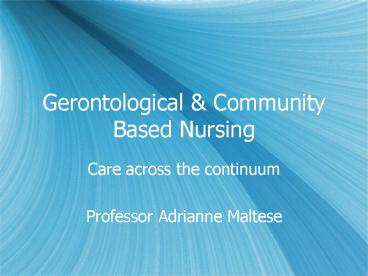Gerontological - PowerPoint PPT Presentation
1 / 22
Title:
Gerontological
Description:
Gerontological & Community Based Nursing Care across the continuum Professor Adrianne Maltese Housing Options for Older Adults Elder friendly Communities Shared ... – PowerPoint PPT presentation
Number of Views:142
Avg rating:3.0/5.0
Title: Gerontological
1
Gerontological Community Based Nursing
- Care across the continuum
- Professor Adrianne Maltese
2
Housing Options for Older Adults
- Elder friendly Communities
- Shared Housing (adult children share)
- Cohabitation- Group homes(share home W/older
adult/intergenerational) - l
3
Benefits- Elder friendly communities
- Address Basic needs
- Optimize Physical Mental Well being
- Promote Social Civic Engagement
- Maximize independence for frail/disabled
4
New Models of Community Care
- PACE (All inclusive care for elders)
- Capitated system
- Cost - monthly for all inclusive care
- Must meet requirements for nursing home admission
- Paid for by Medicare/Medical/Medicaid
5
Adult day Care Services
- Community based programs
- Provides social health services
- Caregiver respite
- Dementia care
6
Senior Retirement Communities
- Various economic levels /cost to consumer
- Need for low-income public housing complex for
older adults. - Other types
- Foster care, Residential Care Facilities
- Assisted living
7
Other housing choices/costs
- Foster care
- Residential Care facilities
- Assisted living
- Continuity car Residence Communities
- Population specific Communities
- Nursing Homes
8
Coalition of Nursing Home Reform
- Issues to be dealt with
- Public - negative views
- Lack of support respect
- Inadequate caregiver salaries
- Poorly staffed -gtunrealistic workload
- Frail -very sick elders
- Creating home environments
9
Principles of Culture Change in Nursing homes
- Empower staff
- Involve residents in their care/decision making
- Provide individualized care
- Built relationships
- Provide sense of community belonging
- Engage resident in meaningful activities
- Create a homelike environment
- Respect for all staff and the value of caring
10
Omnibus Reconciliation Act 1987 (OBRA)
- OBRA - mandated
- MDS -Minimum Data Set
- Increased training requirements
- Elimination of use of meds/restraints
- Bill of Rights for Long Term Care residents
11
Loss Grief
- Loss -gtgrief-gtprocess of bereavement
- Grief is the individuals response to a loss and
mourning is an active and evolving process that
includes those behaviors used to incorporate the
loss experience into ones life after the loss.
12
Loss, Grief End of Life Care
- Wordens Model 2003- grieving process series of
evolving tasks - Acceptance stage -person accepts of reality of
loss - Working stage - person works through physical
emotional pain - Adjustment stage - person adjusts to a change in
environment - Relocation of loss - person is able to
emotionally move on with life
13
Loss , Grief End of life
- Jetts Loss Response Model - incorporates a
systems approach - Loss-gt stage of disequilibrium
- Search for meaning of loss
- Story of loss is told repeatedly
- (this helps in the grieving process)
- Adaptation accommodation of new roles
14
Types of Grief
- Anticipatory grief -gtpremature detachment
sociological death premature withdrawal of a
person psychological death - Acute grief - a crisis. - person feels physically
sick is emotionally distressed - preoccupied
with the loss-gtfunctional disruption - intense
for first 3 months - Chronic grief - may temporarily inhibit
activities intermittent pain of grief
-exacerbated on anniversary dates. - Pathological chronic grief - c/b excessive
irrational anger, insomnia, major depression
15
Implications for nursing care
- Assessment
- tell me about recent events in your life
- Look for concurrent stressors
- what spiritual beliefs do you hold in relation
to death?
16
Implications for nursing care
- Goal- to attain healthy adjustment to the loss
to reestablish equilibrium - Interventions -
- Gently establish rapport
- Offer reasonable hope /emotional support
- Offer support for functional disruption
- Provide information about the disease that may
help person to process the loss. - Allow/encourage grievers to inform others
- Facilitate elder to reorganize their life
- Guide encourage the reframing of memories
17
Conceptual Models -Death Dying
- Living-Dying Interval - (Pattion 1977) -the time
between first learning about the impending death
crisis knowledge until the time of the actual
physiologicaldeath.
18
Needs of the Dying their Families
- The 6 Cs Approach to caring for the dying
their families - - Care - best possible care
- Control - active participant in own care
- Composure -within the realm of ones culture
- Communication- 4 types of communication
identified (Closed awareness,suspected
awareness,mutual pretenseopen awareness - Continuity - establish legacies
- Closure - corresponds with reconciliation
transcendence
19
(No Transcript)
20
Palliative VS. Hospice Care(ANA-ELNEC)
- No hospitalization
- Focus on comfort vs. cure
- No invasive procedures
- Hospice orgs. provide medical,nursing,nurse
assistants,chaplain, - social worker
- 24 hr support pt family
- Bereavement services
21
Nursing Interventions
22
Nursing Interventions
- Encourage discussion of end- of-life
- Decisions re type of care
- Advance directives
- Euthanasia - Active vs. passive.
























![⚡[PDF]✔ Research Design in Aging and Social Gerontology: Quantitative, Qualitative, PowerPoint PPT Presentation](https://s3.amazonaws.com/images.powershow.com/10051225.th0.jpg?_=20240608119)
![[PDF] Gerontological Nursing: Competencies for Care 5th Edition Android PowerPoint PPT Presentation](https://s3.amazonaws.com/images.powershow.com/10077880.th0.jpg?_=20240716116)





![[PDF] READ] Free Ebersole and Hess' Gerontological Nursing & Healthy A PowerPoint PPT Presentation](https://s3.amazonaws.com/images.powershow.com/10126992.th0.jpg?_=202409090910)